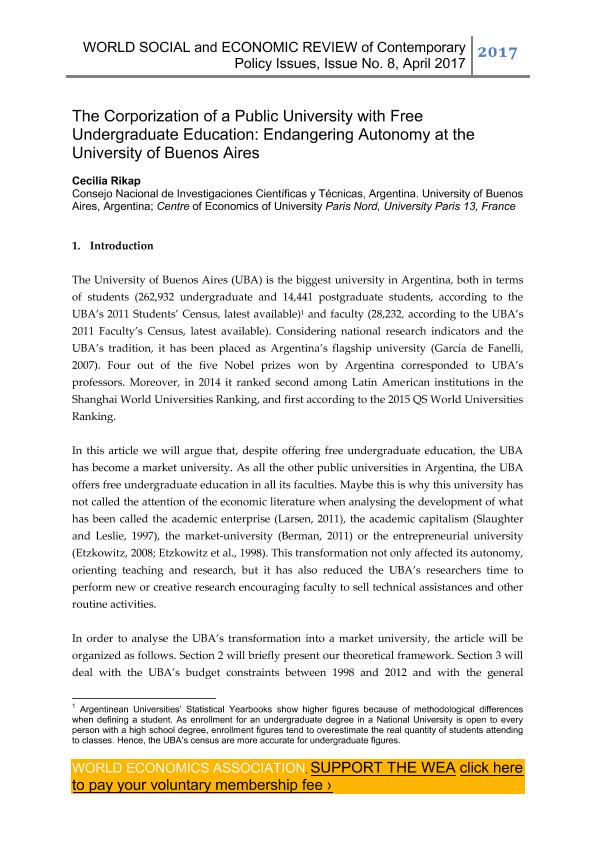Mostrar el registro sencillo del ítem
dc.contributor.author
Rikap, Cecilia Alejandra

dc.date.available
2019-06-04T20:40:25Z
dc.date.issued
2017-04
dc.identifier.citation
Rikap, Cecilia Alejandra; The corporization of a public university with free undergraduate education: endangering autonomy at the University of Buenos Aires; World Economics Association; World social and economic review of contemporary policy issue; 8; 4-2017; 44-59
dc.identifier.issn
2049-3517
dc.identifier.uri
http://hdl.handle.net/11336/77607
dc.description.abstract
The University of Buenos Aires (UBA) is the biggest university in Argentina, both in terms of students (262,932 undergraduate and 14,441 postgraduate students, according to the UBA’s 2011 Students’ Census, latest available)1 and faculty (28,232, according to the UBA’s 2011 Faculty’s Census, latest available). Considering national research indicators and the UBA’s tradition, it has been placed as Argentina’s flagship university (García de Fanelli, 2007). Four out of the five Nobel prizes won by Argentina corresponded to UBA’s professors. Moreover, in 2014 it ranked second among Latin American institutions in the Shanghai World Universities Ranking, and first according to the 2015 QS World Universities Ranking. In this article we will argue that, despite offering free undergraduate education, the UBA has become a market university. As all the other public universities in Argentina, the UBA offers free undergraduate education in all its faculties. Maybe this is why this university has not called the attention of the economic literature when analysing the development of what has been called the academic enterprise (Larsen, 2011), the academic capitalism (Slaughter and Leslie, 1997), the market-university (Berman, 2011) or the entrepreneurial university (Etzkowitz, 2008; Etzkowitz et al., 1998). This transformation not only affected its autonomy, orienting teaching and research, but it has also reduced the UBA’s researchers time to perform new or creative research encouraging faculty to sell technical assistances and other routine activities.
dc.format
application/pdf
dc.language.iso
eng
dc.publisher
World Economics Association
dc.rights
info:eu-repo/semantics/openAccess
dc.rights.uri
https://creativecommons.org/licenses/by-nc-sa/2.5/ar/
dc.subject
University'S Corporization
dc.subject
University'S Autonomy
dc.subject
Own Resources
dc.subject
Universidad de Buenos Aires
dc.subject.classification
Economía, Econometría

dc.subject.classification
Economía y Negocios

dc.subject.classification
CIENCIAS SOCIALES

dc.title
The corporization of a public university with free undergraduate education: endangering autonomy at the University of Buenos Aires
dc.type
info:eu-repo/semantics/article
dc.type
info:ar-repo/semantics/artículo
dc.type
info:eu-repo/semantics/publishedVersion
dc.date.updated
2019-05-28T18:43:52Z
dc.journal.volume
8
dc.journal.pagination
44-59
dc.journal.pais
Reino Unido

dc.journal.ciudad
Bristol
dc.description.fil
Fil: Rikap, Cecilia Alejandra. Universidad de Buenos Aires. Facultad de Ciencias Económicas. Instituto de Investigaciones Económicas. Centro de Estudios para la Planificación del Desarrollo; Argentina. Consejo Nacional de Investigaciones Científicas y Técnicas; Argentina
dc.journal.title
World social and economic review of contemporary policy issue
dc.relation.alternativeid
info:eu-repo/semantics/altIdentifier/url/http://wer.worldeconomicsassociation.org/papers/the-corporization-of-a-public-university-with-free-undergraduate-education-endangering-autonomy-at-the-university-of-buenos-aires/
Archivos asociados
